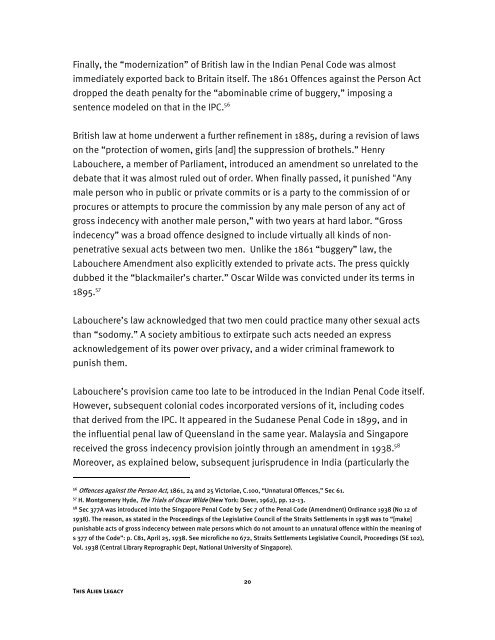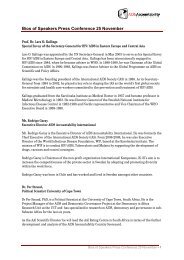This Alien Legacy
This Alien Legacy - Human Rights Watch
This Alien Legacy - Human Rights Watch
- No tags were found...
You also want an ePaper? Increase the reach of your titles
YUMPU automatically turns print PDFs into web optimized ePapers that Google loves.
Finally, the “modernization” of British law in the Indian Penal Code was almost<br />
immediately exported back to Britain itself. The 1861 Offences against the Person Act<br />
dropped the death penalty for the “abominable crime of buggery,” imposing a<br />
sentence modeled on that in the IPC. 56<br />
British law at home underwent a further refinement in 1885, during a revision of laws<br />
on the “protection of women, girls [and] the suppression of brothels.” Henry<br />
Labouchere, a member of Parliament, introduced an amendment so unrelated to the<br />
debate that it was almost ruled out of order. When finally passed, it punished "Any<br />
male person who in public or private commits or is a party to the commission of or<br />
procures or attempts to procure the commission by any male person of any act of<br />
gross indecency with another male person,” with two years at hard labor. “Gross<br />
indecency” was a broad offence designed to include virtually all kinds of nonpenetrative<br />
sexual acts between two men. Unlike the 1861 “buggery” law, the<br />
Labouchere Amendment also explicitly extended to private acts. The press quickly<br />
dubbed it the “blackmailer’s charter.” Oscar Wilde was convicted under its terms in<br />
1895. 57<br />
Labouchere’s law acknowledged that two men could practice many other sexual acts<br />
than “sodomy.” A society ambitious to extirpate such acts needed an express<br />
acknowledgement of its power over privacy, and a wider criminal framework to<br />
punish them.<br />
Labouchere’s provision came too late to be introduced in the Indian Penal Code itself.<br />
However, subsequent colonial codes incorporated versions of it, including codes<br />
that derived from the IPC. It appeared in the Sudanese Penal Code in 1899, and in<br />
the influential penal law of Queensland in the same year. Malaysia and Singapore<br />
received the gross indecency provision jointly through an amendment in 1938. 58<br />
Moreover, as explained below, subsequent jurisprudence in India (particularly the<br />
56<br />
Offences against the Person Act, 1861, 24 and 25 Victoriae, C.100, “Unnatural Offences,” Sec 61.<br />
57<br />
H. Montgomery Hyde, The Trials of Oscar Wilde (New York: Dover, 1962), pp. 12-13.<br />
58<br />
Sec 377A was introduced into the Singapore Penal Code by Sec 7 of the Penal Code (Amendment) Ordinance 1938 (No 12 of<br />
1938). The reason, as stated in the Proceedings of the Legislative Council of the Straits Settlements in 1938 was to “[make]<br />
punishable acts of gross indecency between male persons which do not amount to an unnatural offence within the meaning of<br />
s 377 of the Code”: p. C81, April 25, 1938. See microfiche no 672, Straits Settlements Legislative Council, Proceedings (SE 102),<br />
Vol. 1938 (Central Library Reprographic Dept, National University of Singapore).<br />
<strong>This</strong> <strong>Alien</strong> <strong>Legacy</strong><br />
20




